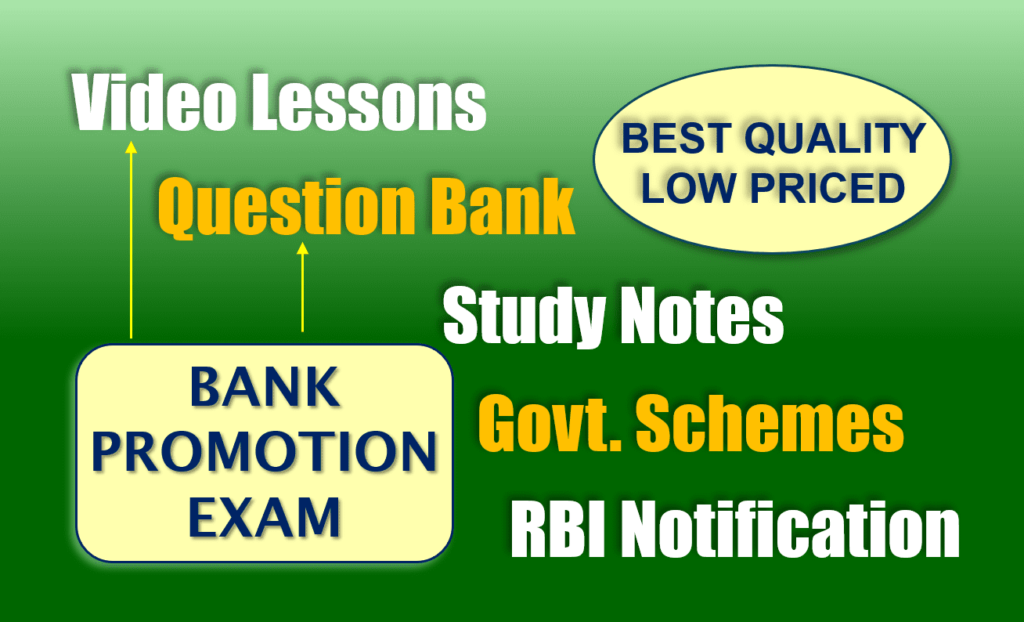20 FAQs on Commercial Paper for Bank Promotion, JAIIB Exam and CAIIB Exam
1 What is a commercial paper (CP)?
Answer: Commercial paper is a financial instrument, in the form of a promissory, used by reputed companies, to raise short term funds, normally for meeting working capital needs.
2 Who is eligible entity to issue commercial paper?
Answer: Following entities can issue commercial paper, fund-based facilities availed by them, if any, are classified as Standard at the time of issue.
a) Companies;
b) NBFCs, including Housing Finance Companies (HFCs);
c) Infrastructure Investment Trust (InvIT) and Real Estate Investment Trust (REIT);
d) EXIM Bank, NABARD, NHB, SIDBI, NABFID
e) A body corporate, statutorily permitted to raise debt in India and having net-worth of at least ₹100 crore
f) Co-op societies and Limited Liability Partnerships (LLP) having net-worth of at least ₹100 crore.
3 Who is eligible to invest in commercial paper?
a) All residents in India
b) Non-residents up an amount and subject to rules/regulations under Foreign Exchange Management Act (FEMA), 1999.
4 What is minimum and maximum denomination in which the commercial paper can be issued?
Answer : It can be issued in minimum denomination of ₹5 lakh. Above Rs.5 lakh, it can be issued in multiples of ₹5 lakh. The aggregate amount shall be within issuer’s Board approved limit or limit specified by the financial sector regulator concerned.
5 What is the minimum and maximum tenor of commercial paper?
Answer: When issued, its tenor should be at least of seven days. The maximum tenor is one year.
6 A company wants to issue a commercial paper with options. Which options are available?
Ans While issuing a commercial paper, the issuers are not allowed to make offer of call or put option.
7 To make sure that commercial paper is subscribed when issued, can the issuer avail underwriting facility?
Answer: According to current regulatory guidelines of RBI, the issuance is not allowed to be underwritten or co-accepted.
8 What is settlement period for making payment of funds to the issuer and issue of commercial paper to the investors?
Answer: The regulatory guidelines of RBI mandate that the payment of funds to the issuer and issue of commercial paper to the investors, shall be settled within a maximum period of T+4 working days which means the deal date plus four working days.
9 Investors of commercial paper include individuals as well as entities. What is the maximum amount which all individuals and Hindu Undivided Families can invest in any primary issuance of commercial paper?
Answer: The total amount of subscription by such category of investors cannot be more than 25% of total amount issued, by the issuer.
10 At the time of issue of commercial paper, if some discount can be offered by the issuer.
Answer: Commercial paper is issued at a discount to face value, which means that an investor investing in a commercial paper having face value of Rs.10 lakh, shall pay to the issuer an amount which shall be shall than Rs.10 lakh, depending upon the coupon rate.
11 What type of liquidity facility can be sanctioned by banks to the issuer, to support repayment of commercial paper when due for payment?
Answer Banks can consider providing a stand-by assistance/credit or back-stop facility for credit enhancement for a commercial paper issue.
12 Funds obtained by the issuer through commercial paper, can be used for what purpose?
Ans Ordinarily, such funds can be used for financing working capital, i.e. current assets and operating expenses. If the issuer intends to use such funds for some other purpose, end-use details will be required to be disclosed in the offer document.
13 What is the requirement from the issuer regarding confirmation that the funds raised through issue have been used for the disclosed purpose?
Ans Chief Executive Officer/Chief Financial Officer (CEO/CFO) of the issuer shall submit a certificate to the Issuing and Paying Agent, within 3 months from date of issue, that the proceeds of commercial paper have been used for the purposes disclosed in the offer document.
14 Is there any rating requirement for issue of commercial paper?
Answer The issuer is required to obtain a credit rating assigned by a SEBI registered Credit Rating Agency which must be ‘A3’ or above
15 What are provisions regarding trading of commercial paper, in the secondary market?
Answer Commercial paper can be traded in Over The Counter market or on recognised stock exchanges.
16 What is the settlement cycle for over-the-counter trades in commercial paper?
Answer As per regulatory requirement it can be T+0 or T+1, basis.
17 If an issuer wants to buy back the commercial paper issued by it, what are the provisions?
Ans Issuers of can buyback the commercial paper before maturity. Such buybacks can be made only after seven days from the date of issue and not earlier.
18 If an issuer default in repay the commercial paper on due date, what are consequences for the issuer?
Answer Information shall be publicly shared through its website by the issuer and also on F-TRAC Trade Repository Platform of Clearing Corporation of India Ltd known as F-TRAC platform.
19 Can an issuer who defaulted in repaying the commercial paper on due date, issue commercial paper, after making payment of the commercial paper, where he had defaulted?
Answer The issuer can issue commercial paper again after full repayment of the defaulted obligation or six months after the date of default, whichever is earlier.
20 Is there any reporting requirement related to issuance and secondary market transactions in commercial paper?
Answer Details of all primary markets issuances are required to be made on the F-TRAC platform by 5:30 PM on the day of issuance. Similarly all secondary market transactions through OTC market or through recognised stock exchanges, are to be reported within 15 minutes.
(FAQs are based on RBI’s Master Direction – RBI (Commercial Paper and Non-Convertible Debentures) Directions, 2024 that came in to force with effect from April 01, 2024)




